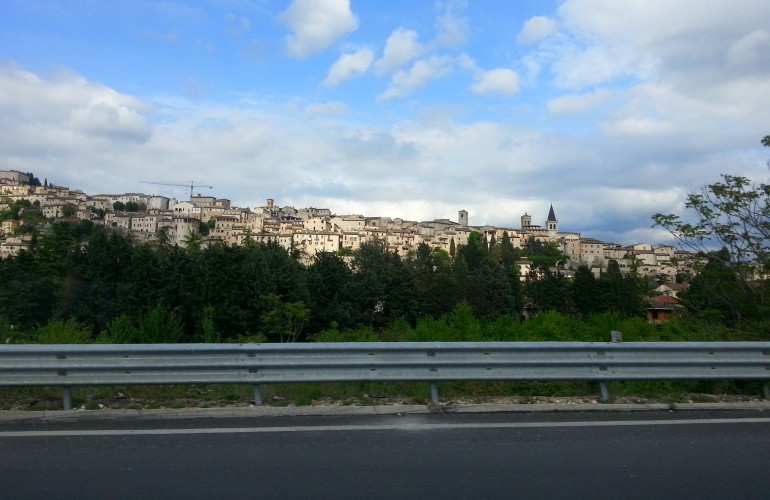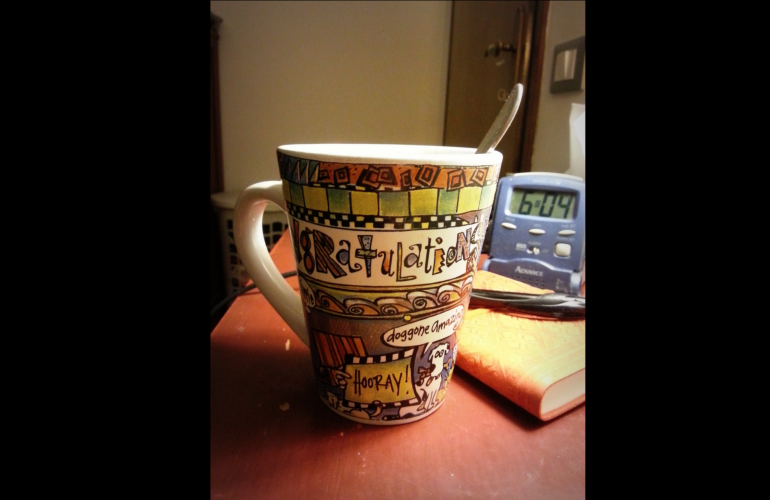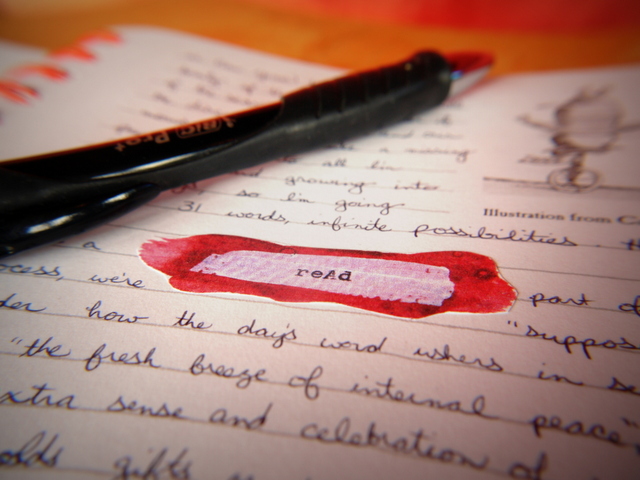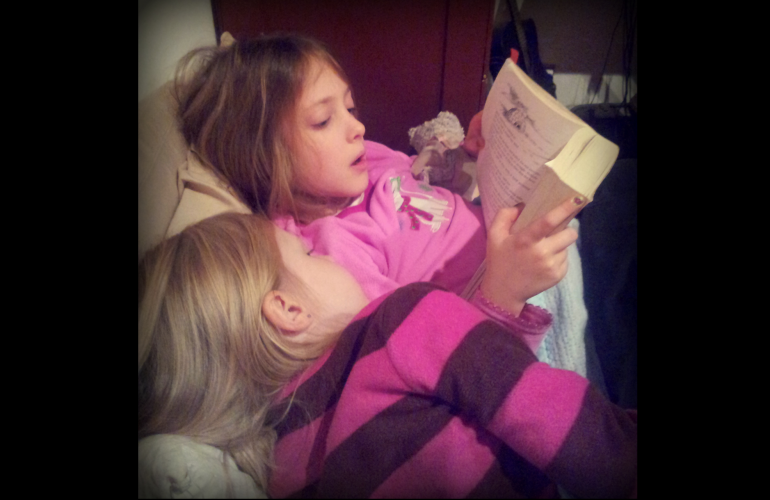One of the best things about road-tripping with Dan is getting those long, uninterrupted miles of time to talk. Early in our relationship, I worried that we’d eventually run out of things to say to each other, and I suppose there’s some validity in that. After all, we live together and work together and can pretty much catch up on each other’s news over a three-minute espresso break. Our day-to-day interactions tend to cluster around the present though—how work projects are going, what to do about Parenting Challenge #5,000,008, which brand of toothpaste is on sale at the grocery store, who’s going to take one for the team and vacuum—and while these are all incredibly glamorous and sexy topics to be sure, they don’t exactly cover the scope of human communication.
In eleven years of marriage, we haven’t left many conversational stones unturned, but coming back to them is always a new experience. I’ve changed so much in the past decade. My views on any given subject are liable to be 180º degrees from what they were when we first talked through it, and part of me feels guilty over that, as if I got Dan to choose me based on false advertising. His love has proven to be expansive though, more than enough to cover all the different iterations of me. Through Dan’s unconditional fondness for me, I’ve been able to grasp the idea of a spacious God… and that’s where one of our road-trip conversations led us last weekend.
We were talking about how people commune with God, and I confessed that no matter how much I’ve tried over the last several years, I just cannot get my soul to click with religious music anymore. Christian bands, worship songs, pretty much any churchy phrases set to chords chafe at me like an outgrown hat. This makes me sad sometimes. I remember what it was like to agree with my heart and my vocal cords with the sentiments of an entire congregation, to float out of my body on the strains of communal devotion. I don’t have that anymore.
But talking with my husband about it helped me re-remember for the umpteenth time that I don’t have to fit in a mold to love and be loved by God. I don’t have to speak or think or vote like a stereotypical Christian (whatever that might be) in order to align my life with Jesus. I don’t have to accept traditional spiritual practices as the only way. And I don’t have to connect with “religious music” to have a religious musical experience. In the end, this thrills me far more than it saddens me. Finding God in unexpected places makes spirituality real to me in a way that predictable experiences never do, so if God is meeting me through rap rather than hymns, I can only take that as proof that my ever-changing self is still very much covered by love.
—
I haven’t done a Non-Churchy Songs for the Soul roundup in a while, but today feels just right for sharing eight more unconventional tracks that are pulling at my soul-strings these days:
1. Glósóli by Sigur Rós
I can’t watch this video without crying. I know that drum-beating rescuer with the kind eyes, don’t you see. This is the story of Jesus… and of the tremulous hope, the rag-tag trust, and the dizzying joy of freedom that have become my story too.
“And here you are, Glowing Sun,
And here you are, Glowing Sun,
And here you are, Glowing Sun,
And here you are…”
2. Rambling Man by Laura Marling
All of Laura’s songs are poetry, but this one in particular folds me into a higher mindset. It’s introspection and self-evaluation and a determined authenticity, and the video above should give you a clue as to how I interpret the rambling life.
“It’s a cold and a pale affair,
And I’ll be damned if I’ll be found there.
Oh give me to a rambling man,
Let it always be known that I was who I am.”
3. Starting Over by Macklemore & Ryan Lewis
I have proven myself incapable of doing anything but sitting up to listen when Macklemore’s on the stereo. This track is one of the best biographies of grace I’ve ever heard, and it always makes me grateful for the hard, beautiful work of being human together. (Just a heads up that this song involves decidedly non-churchy language.)
“We fall so hard,
Now we gotta get back what we lost.
I thought you’d gone,
But you were with me all along.”
4. I Want to be Well by Sufjan Stevens
I’ve posted this song before because it so fully expresses my gut feelings/thoughts/prayers when PTSD yanks my breath out from under me. (Note: The following does not involve polite language either.) What comes to mind when I listen to it is a question from the Bible that Jesus asked a lifelong invalid: “Do you want to get well?” How many times had that man wailed to God, “I’m not fucking around”? And to learn, after all those years, that neither was God…
“I want to be well, I want to be well,
I want to be well, I want to be well.
I’m not fucking around, I’m not, I’m not,
I’m not fucking around.”
5. Me and God by The Avett Brothers
Now, you know I’ve got to love anyone who admits to using curse words when they pray. (See: previous two songs.) I can still remember what it was like to read in the Bible, of all places, that God just wanted our honest, simple selves—no church-sanctioned polish, no middle men on pedestals, just us. The relief of it still makes me grin wide.
“Well I found God in a soft woman’s hair,
A long day’s work and a good sittin’ chair,
The ups and downs of the treble clef lines,
And five miles ago on an interstate sign.
My God, my God and I don’t need a middle man.”
6. When Death Dies by Gungor
I’m fudging my own rules to include this self-proclaimed Christian band on the list, but I’ve never heard a beat-boxing cellist at church, so I think you’ll forgive me. This song is everything I believe about heaven, everything I believe we get to dream of one day.
“Where it comes, poor men feast.
Kings fall down to their knees.
When death dies, all things live,
All things live.”
7. Bible Belt by Dry the River
This is another one that speaks directly to my experience growing up under fundamentalism. It’s sad and beautiful and ultimately shining bright with the hope that comes of bravery and companionship. And if I said that Jesus was the one waiting for me on the 5:45 to whisk me away from the Bible Belt, would you believe me?
“Cause we’ve been through worse than this before we could talk.
The trick of it is, don’t be afraid anymore.”
8. Take Up Your Spade by Sarah Watkins
Sarah’s always had a way of making life sound uncomplicated and pure, and this little hymn to new days and new grace helps get me out of bed when the morning dawns heavy. Plus, that’s Fiona Apple singing with her. Perfection.
“Shake off your shoes, leave yesterday behind you,
Shake off your shoes but forget not where you’ve been,
Shake off your shoes, forgive and be forgiven;
Take up your spade and break ground.”
What about you? Any songs been tugging at your soul-strings lately?
—
Previous roundups:




